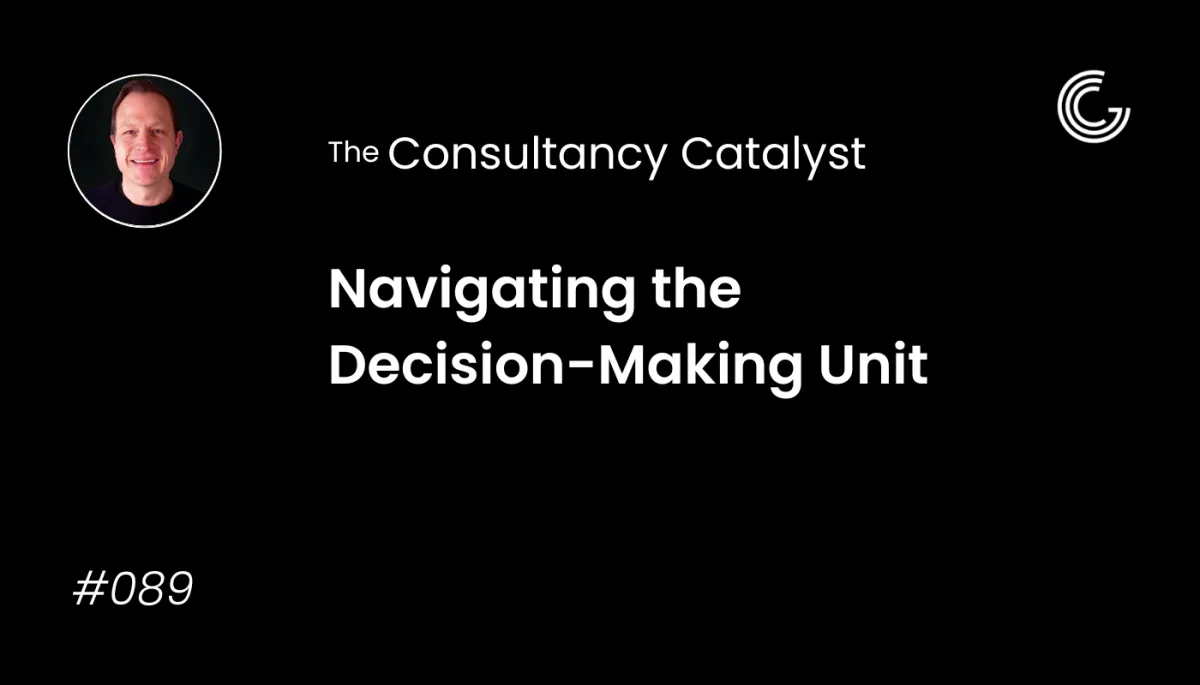The Consultancy Catalyst
Practical tips to build a more valuable, impactful and fulfilling consultancy.
Every Friday morning, you'll get 1 actionable tip to make your consultancy more valuable, impactful and fulfilling in less than 4 minutes.

Navigating the Decision-Making Unit
Ever had a deal that felt like a done deal… until someone new joined the email thread?
You've built trust with the key contact, nailed the proposal, and maybe they've said the decision is all down to them. Then they drop the "This looks great - I just need to run it past the team."
That's the moment everything changes.
The Solo DM vs. the DMU
In consultancy sales, there are two kinds of buyers:
The Solo Decision Maker is fast, decisive, and often entrepreneurial. They buy on trust and energy, they love your vision and move quickly. You probably sit in this category, and everyone selling their sales systems to you is specialising in this type of sale.
The Decision-Making Unit is slower, layered, and political. They buy on risk mitigation and proof.
If you’re selling to senior decision makers in mid-sized and larger businesses, this is who you’re selling to. Even if your main point of contact is the CEO, they have to sell their decisions to the rest of the board.
Selling to a solo DM feels easy. You talk the same language. They want speed and transformation.
But when your offer reaches a DMU, everything shifts. The focus moves from "How can this work?" to "What might go wrong?"
The real trap
If you don't have a sales background, it's easy for solo and boutique consultancies to build their whole sales approach around how they buy. It works brilliantly if you’re targeting other businesses like yours, or when you’re selling to referrals that come in with pre-built trust. But everything changes when you start going after bigger clients that don’t know you before you engage for the first time.
That's when projects get stuck in "internal review." New people appear with new objections.
Momentum dies, even when the need is real.
The trap isn't the DMU itself. It's treating the DMU like a solo buyer, relying on one champion to carry the deal.
How to navigate it
1. Map your territory
Anticipate multiple stakeholders and map them. Ask your champion:
"Who else will be involved in shaping this decision?"
"Who cares most about seeing this succeed?"
You're not going around them; you're helping them sell it internally.
2. Understand your threats
Bigger buyers usually have to get at least three quotes before they buy. This doesn’t always happen, but it is incredibly rare that you won’t be going up against any competition. Find out who the competitors are, then research them.
Yes, you’ve got your USPs, but if you don’t know who your competitors are, you’ve got no way of positioning yourself against them.
3. Arm your champion
Solo buyers buy on stories and results. DMUs buy on risk and evidence - and your main contact needs to defend your proposal in rooms you'll never enter.
Give them the ammunition: metrics that prove ROI, testimonials from similar clients, case studies that address objections before they're raised. Make your proposal so clear that it sells itself when you're not there.
4. Chart the human stakes
Even in a committee, emotion drives momentum. A DMU isn't a faceless bureaucracy; it's made of people with careers, reputations, and problems they need solved.
Use your discovery calls to uncover what's really at stake: the promotion riding on this project, the pain point keeping someone up at night, the legacy someone wants to build. That emotional thread is what keeps a DMU aligned when the process slows down.
What I see in my community
Looking at my community of clients, 80% sell to a DMU, but few have had formal training in how to. They’ve often formed part of one, but they’ve hardly ever been responsible for selling to them.
It’s a bit like crossing an ocean in a cruise liner compared to sailing single-handed in a yacht. You’re no longer going for a ride; you have to actively participate in the journey.
When you know how to navigate a DMU, you stop waiting for "buy-in" and start creating it.
Want the step-by-step system?
My Ready-To-Buy Playbook shows exactly how to build predictable client acquisition for solo and boutique consultancy owners - including how to handle complex buying committees without losing momentum.
Subscribe to the Newsletter
Join fellow specialist consultancy owners reading The Consultancy Catalyst every Friday for exclusive tips, strategies and resources to make your consultancy move valuable, impactful and fulfilling.
Testimonials

We are so grateful for the amazing photos that [photographer's name] took of our wedding day.
Jane Doe



